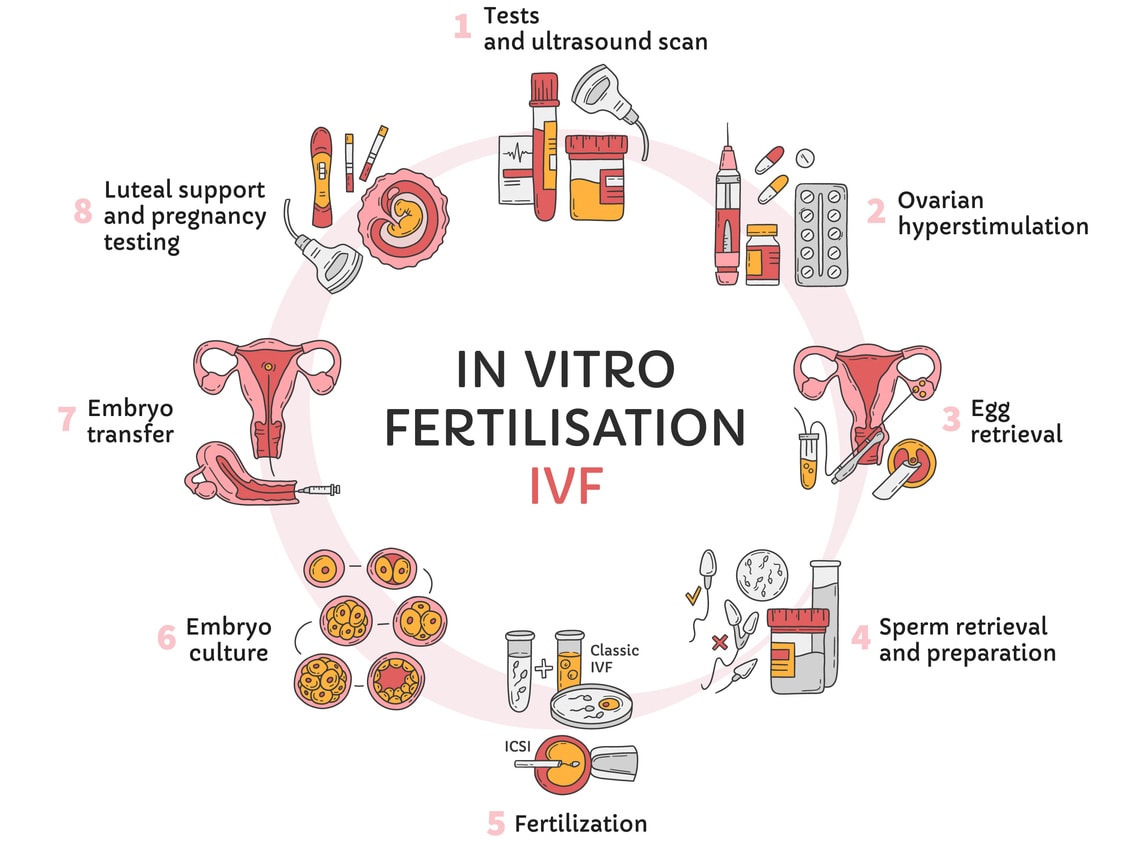Having children is a desire for many adults, but infertility struggles dampen that dream for some people. For couples experiencing infertility, the complex world of fertility treatments can be a daunting journey to face.
Infertility is the inability to become pregnant after 12 or more months of regular unprotected sexual intercourse.1 Around 17.5% of the worldwide adult population will experience infertility. For women aged 30-39, the likelihood of experiencing infertility is around 1 in 5, and for women younger than 30 years old, the rate is closer to 1 in 8.2
This article will help give you a better understanding of the potential causes of infertility and the fertility treatments most commonly used to help you conceive.
While there can be various reasons a woman has trouble conceiving, the most common causes of female infertility are:1,2,3
- Endometriosis
- Structural problems of the reproductive tract, fibroids, or polyps
- Autoimmune or kidney disease
- Pelvic inflammatory disease
- Polycystic ovary syndrome or PCOS
- Poor egg quality and follicular disorders
- Infrequent or absent menstrual cycles
PCOS is a condition that causes a woman to ovulate irregularly or not at all. It causes elevated testosterone levels in a woman’s body, which causes acne, excessive hair growth, and infertility.2,8
While some causes of infertility are due to factors out of a woman’s control, some risk factors predispose a woman to infertility. These factors include:2
- Advanced age
- Smoking and tobacco use
- Excessive alcohol intake
- Being overweight, obese, or underweight
- Extreme weight gain or weight loss
- Excessive physical or emotional stress causes a loss of periods
The first step your doctor will take to determine the possible cause of your infertility is to obtain a complete medical and sexual history.2 This will give them a better picture of your overall health and help them identify any risk factors that may predispose you to infertility.
Once your doctor has your history, they will examine you for any structural or hormonal explanations for your infertility before recommending fertility treatments. This typically involves a pelvic exam, ultrasound, and blood work to determine your hormone levels.3 It may also involve a fallopian tube exam with an X-ray and an exam of your uterus using a flexible camera inserted into your uterus through your vagina, known as a hysterosalpingogram (HSG).3 Your doctor can guide you to the correct fertility testing based on your health history.
There has been a long-standing belief that only women experience infertility, but men also experience infertility struggles. Causes of male infertility include the following:3
- Problems with the shape, movement, or amount of sperm
- Enlarged veins in the scrotum
- Genetic disorders
- Low testosterone levels
- Use of anabolic steroids
- Undescended testicles
- History of chemotherapy
- Surgical procedures to the testicles, such as a vasectomy
While most of these causes of infertility are out of a man’s control, common risk factors can predispose a male to infertility.2 They include:
- Advanced age
- Being overweight or obese
- Excessive alcohol or drug use
- Exposure to excessive testosterone and radiation levels
- Exposure to high temperatures, such as hot tubs
- Exposure to environmental toxins such as pesticides, lead, or mercury
The first step to determine the possible cause of infertility is the same for both men and women. Your doctor will complete a medical and sexual history to understand your overall health better and determine any of your risk factors for infertility.2 Your doctor may perform a scrotal exam and ultrasound to check for structural concerns. They may also run blood tests to check for hormonal imbalances. The final test is a semen analysis to look at the shape, size, number, and movement of your sperm.3 These tests will help your doctor form a picture of your infertility and point you and your partner to the correct fertility treatment options.
Regardless of the fertility treatments you and your partner may pursue, medications will likely be a part of your journey. You may be prescribed Clomid or Letrozole for fertility medications, or you may be prescribed something else. The most common medications are:2
- Letrozole: This is used to help temporarily lower a woman’s progesterone levels, which tells the body to produce more follicles or mature eggs. It can also be used to cause ovulation in a woman with PCOS.
- Clomid: This is used to cause ovulation in women with PCOS or those with problems with ovulation and to help women with normal ovulation produce more mature eggs.2
- Hormones: Various hormones can help a woman develop more mature eggs with each cycle or help the uterus prepare for an embryo transfer.
- Metformin: This is used to treat women with insulin resistance, diabetes, or PCOS. This medication helps lower the high levels of testosterone in women with PCOS. It is a common PCOS fertility treatment that can help the body ovulate.
IUI, or intrauterine insemination, is a fertility treatment procedure in which sperm is directly inserted into a woman’s uterus through her vagina.2 IUI is typically used as the first line of treatment for women experiencing unexplained infertility or whose male partner can produce sperm.2 The success rate with IUI is similar to that of normal conception, or around 20%.4
Some insurance companies will cover some or all of the IUI costs, so check your fertility benefits with your carrier. If your insurance plan does not cover IUI, you can expect to pay $300-$4,000 per round of IUI, depending on the medications and testing needed.4
A licensed reproductive specialist at a medical center typically performs an IUI. While there are products on the market to complete artificial insemination at home, that option may not be the best or safest option. Before attempting the procedure, please speak with your doctor about the risks and benefits of at-home artificial insemination.4

IVF, or in vitro fertilization, is a fertility treatment procedure where the egg and sperm combine outside of the woman’s body to create an embryo through a process called egg retrieval. A woman will take different IVF injections of medicine that will help her produce mature eggs. The eggs are then retrieved from the woman’s ovaries, and fertilization with the man’s sperm is done in a laboratory setting. After three to five days, the fertilized embryo is put into the woman’s uterus. During IVF, you can freeze multiple embryos to use at a later date.2
IVF is typically used for women with fallopian tube damage or blockage, endometriosis, uterine fibroids, and ovulation disorders. IVF is also used for men who have impaired sperm function or production or for couples with unexplained infertility who do not qualify for IUI.5
The success rate with IVF is hard to pinpoint as it depends on many factors. These factors include:6
- Age of the parents
- Quality of the embryo
- Parents medical history
- Cause of infertility
- Lifestyle risk factors such as smoking and drug and alcohol use
The cost of IVF can vary depending on the medications and procedures. However, some insurance carriers will cover some or all the costs, so check with your insurance carrier before starting treatment.
While most causes of infertility are due to structural abnormalities of the reproductive tract, poor sperm quality, or hormonal imbalances, there are some lifestyle changes that you can make to help increase your chances of conceiving. These changes include:7
- Avoiding drug and tobacco use
- Avoiding high temperatures for men, such as hot tubs
- Exercising regularly
- Limiting caffeine for women
- Maintaining a healthy weight
The world of fertility treatments is large and often scary and confusing. It is important to remember that while there are many fertility treatment options, your doctor can explain the best options for treatment and help guide you through the process. Don’t be afraid to ask questions. You must feel comfortable with whatever options you and your partner pursue.

 PARENTING TIPS
PARENTING TIPS PREGNANCY
PREGNANCY BABY CARE
BABY CARE TODDLERS
TODDLERS TEENS
TEENS HEALTH CARE
HEALTH CARE ACTIVITIES & CRAFTS
ACTIVITIES & CRAFTS


